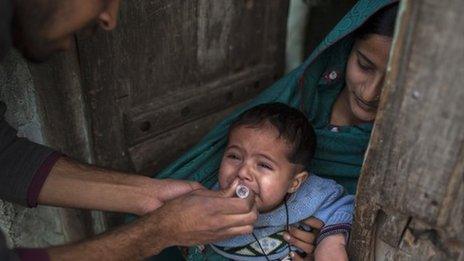The parents refusing to vaccinate their children against polio
- Published
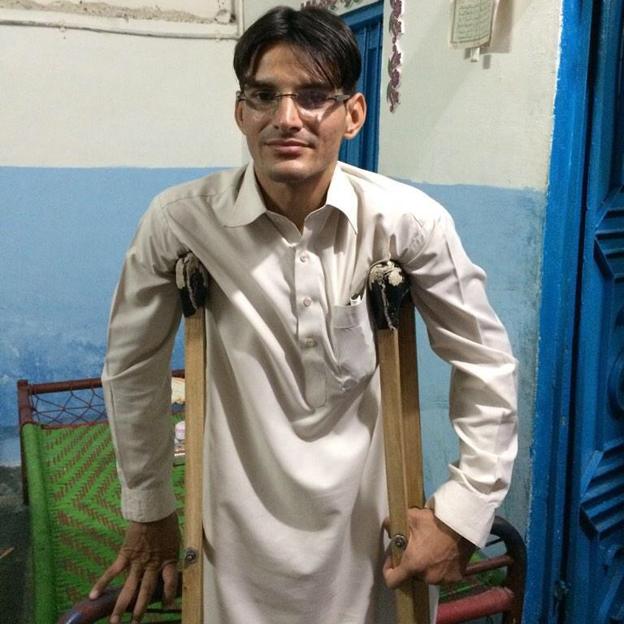
There have been more than 200 cases of polio in Pakistan since January - the first time infections have reached this level in nearly 15 years. Despite this, not everyone wants their children to be vaccinated.
Abrar Khan, who is 26, makes his way into a poor neighbourhood of Karachi called Baldia.
On his crutches, he carefully avoids potholes and dirty cesspools in the narrow alleyways lined, on both sides, with small houses.
He contracted polio when he was three. Now he's part of a team trying to change the minds of families who refuse to have their children vaccinated.
Many people here think the polio vaccination campaign is a western conspiracy to sterilise their children - it's an idea the Taliban have been putting about for 10 years now.
In 2012 the militants ordered a complete ban on vaccinations in the tribal areas in western Pakistan as a response to US drone attacks.
Since then there's been no immunisation in that area.
As a result, says the children's charity Unicef, nearly 300,000 children have missed out on vaccination in that area in the last two years.
Most of the residents of Baldia came originally from Pakistan's tribal areas and most are reluctant to immunise their children.
Yet this is considered a high risk area for polio and I can see why. There's no sanitation to speak of.
As I walk through the narrow streets, I pass an open sewer running through a residential area.
Even before you see this canal full of sewage and rotten rubbish, you can smell it.
It's just the sort of environment in which polio thrives yet around us are about a dozen children, who all look under the age of five, playing in these squalid conditions.
Khan and the other health workers are being escorted by armed policemen. Without their protection the polio team can't do their job.
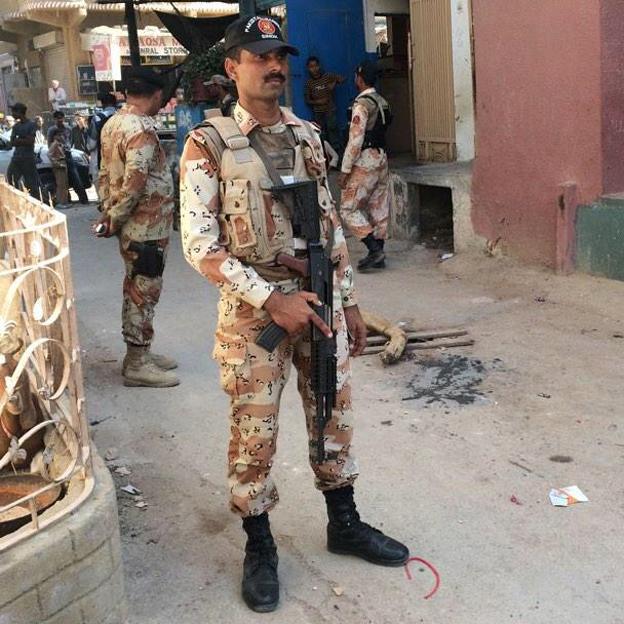
Many health workers and security personnel have been killed during immunisation campaigns across the country - I'm told there was a shooting in this neighbourhood not long ago.
We stop at one of the houses and an elderly woman answers the door. Four curious little children pop out next to her.
"None of the neighbours' kids has had it," she says of the vaccine. "Why are you after my grandchildren? I don't want this, I don't trust it," she adds angrily as she waves us away.
Khan moves on to the next house. A man stands in front of the entrance and starts shouting at him: "My children don't need this. Leave them alone! Why are you after them? And why just polio? There are other diseases why are you focusing on this one?" he yells.
Khan calmly replies: "We're trying to eliminate polio. We're trying to show that we can do this."
But the man shouts back: "Show who? America? I don't care about them."
People start to gather round us as he shouts: "I don't trust this team."
Khan tries again, this time he takes out a small brochure from a folder he has with him. It's a fatwa, a religious decree from a well-known cleric, which condones polio vaccination.
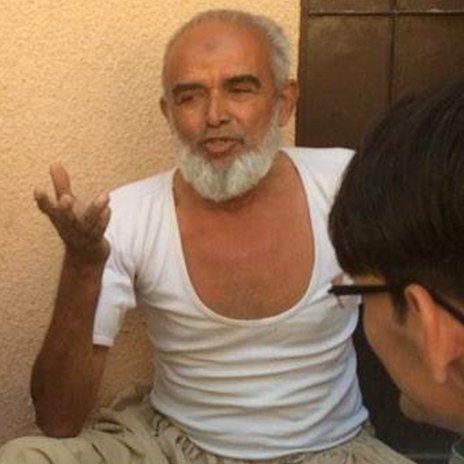
A man argues against having his children vaccinated
"What's this?" the father says, now more agitated than ever. "I can't read," he says, "why are you giving me this?"
Finally he tells Khan to leave, goes back into the house and slams the door.
As we walk away from the house, Khan explains: "I try to tell them in any way I can, but they aren't willing to listen. I say 'look at me, I'm a victim of polio. Your children could be like me,'" he says, pointing at his legs.
I can hear the frustration in his voice: "This man is doing his children a big injustice. He's taking them down a path of lifelong disability. He's the children's worst enemy."
This refusal to vaccinate is one of many reasons why Pakistan is failing to eradicate polio. But it's not just the influence of the Taliban - experts now point the finger at government mismanagement as well.

Polio
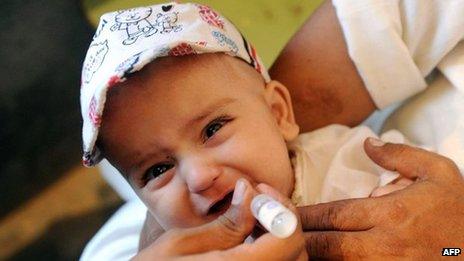
Poliomyelitis mainly affects children under five
Invades the nervous system and can cause total paralysis within hours
One in 200 infections leads to irreversible paralysis
Polio cases have decreased by more than 99% since 1988
Endemic in three countries - Afghanistan, Nigeria and Pakistan
There is no cure but the virus can be prevented by immunisation

A recent report described Pakistan's polio programme as a disaster. Campaigns take a long time to organise and when they finally get under way, they're inefficient.
The polio workers themselves are overworked and underpaid and they risk their lives trying to do their job.
Some tell me they have to wait for days to get the proper security personnel to escort them.
And so there have been more than 200 cases this year - that's more than 200 families watching their loved ones suffer from something that could easily have been prevented.
At the end of a long day Khan invites me back to his family house. He got married recently and I meet his bride and about a half a dozen other women. his sisters and sisters-in-law.
Altogether there are seven families in the house and between them around 26 children.
"How many children do you want?" I ask him. "Three inshallah, God willing," he says, "and I will vaccinate them," he adds, with a hopeful smile.
How to listen to From Our Own Correspondent, external:
BBC Radio 4: Saturdays at 11:30
Listen online or download the podcast.
BBC World Service: Short editions Monday-Friday - see World Service programme schedule.
Subscribe to the BBC News Magazine's email newsletter to get articles sent to your inbox.
- Published4 October 2014
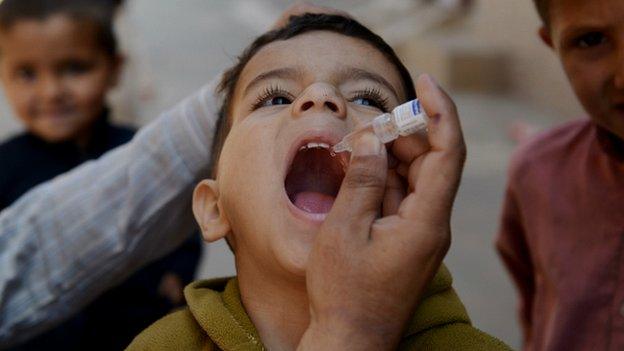
- Published24 October 2014
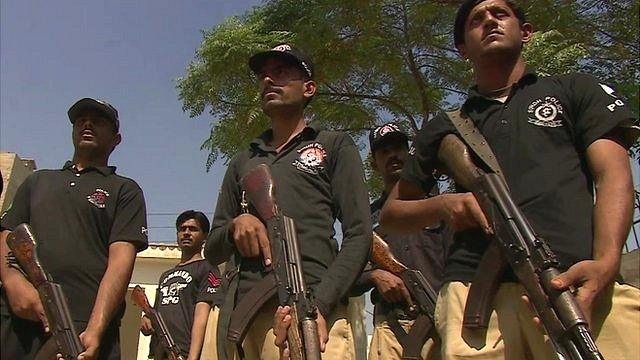
- Published1 March 2014
